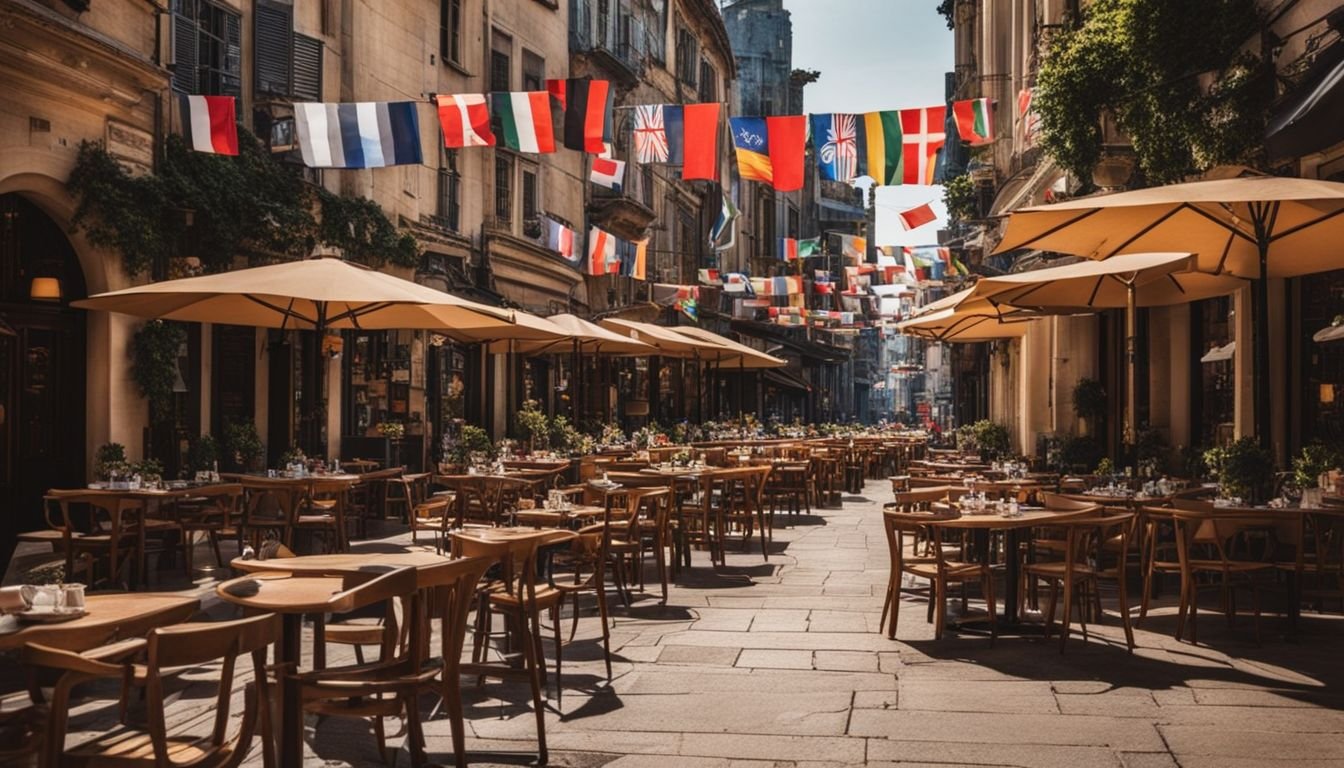Expat Life: Integration and Social Groups
Living abroad presents unique challenges, like feeling disconnected. Expat communities ease this loneliness by connecting those from various countries. This blog offers strategies for integrating into new cultures and finding friends through social groups.
Keep reading to learn how.
Challenges of Expat Life

Living in a new country brings big challenges. You may feel left out and find it hard to fit into the new culture.
Social Segregation
Expats often find themselves in groups away from the local community. A lady in Cuenca, Ecuador, did not like calls in Spanish. This shows how people can stay apart even when they move to new places for different experiences.
Nine expats felt left out at their work because everyone else stuck together. This made them feel alone.
Cultural disconnection is next. It talks about how hard it is to fit into a new place when things are so different from what you’re used to.
Cultural Disconnection
Moving to a new country brings excitement but also challenges. One big challenge is cultural disconnection. People often move without learning much about the local ways of life. They find it hard to fit in or understand what people do and why they do it.
This makes them feel lost and alone.
Tools like Facebook Messenger, WhatsApp, and Instagram can help, but they are not enough. Talking through these apps does not fully teach someone the culture. Language problems make things harder.
Not speaking the local language well stops expats from making deep connections with locals. They struggle to share ideas and feelings clearly, which isolates them more.
Frequent Relocation
Frequent relocation changes how people view and interact with each other. An expat in Veracruz ignored local ways and the area’s environment. This attitude can upset locals and make fitting in hard.
Moving often mixes different backgrounds, affecting social norms.
Organizational support helps expats adjust to new work settings. It boosts their overall well-being. Both job-related and personal factors play a role in an expatriate’s happiness.
Regular moves test these supports, making settling down and creating lasting connections challenging.
The Irony of Expat Friendships
Expat life brings unexpected friendship stories. These friends can be both your closest or just passing connections due to moving often.
Always the Outsider
Feeling like an outsider is common for expats. Language barriers and cultural differences make it hard to connect with locals. This leads to a slow process in developing local friendships.
Expats often face transient friends who might move away, adding to the sense of being on the outside.
Using tools like Skype, Facetime, and other voice call apps helps bridge some gaps. These platforms allow expats to maintain connections across distances, but can’t fully replace face-to-face interactions within their new communities.
Despite these efforts, the challenge remains: building deep and lasting relationships in a foreign land takes time and effort.
Mix and Match Friendships
Expats find friends from all walks of life. They meet people from different backgrounds and cultures. This mix helps them feel less like outsiders. Expats often use smartphones, social media, and VOIP applications to stay connected.
These tools make it easy to share news and have conversations.
Next, they learn about the expat grapevine.
The Expat Grapevine
The Expat Grapevine acts as a vital network for sharing experiences and advice among expatriates. This informal system allows expats to connect over online platforms like instant messaging, voice calls, and video calls through devices such as iPhones and Androids.
It plays a crucial role in overcoming the sense of isolation many expats face. Through this grapevine, members learn about local events, navigate cultural integration challenges, and find ways to engage with their new community.
Clubs specifically for expatriates use tools like Google Duo and text messaging to invite members to gatherings and share important tips on adapting to life abroad. These interactions help reduce feelings of being marginalized or disconnected from the local culture.
Expats gain insights into fine print details like privacy policies in new environments, making it easier for them to settle in comfortably.
Strategies for Building Social Connections
To build social ties, putting yourself out there and starting conversations can open many doors.
Say Yes to Social Invitations
Accepting social invitations opens doors to new friendships. Going to parties, meet-ups, or outings means you get to meet people face-to-face. This is key for expats looking to connect in a new place.
Face time beats texting and online chats because you see facial expressions and hear tonal languages. These cues help understand someone better.
Amie-Jo Locke’s quest after two years without invites shows the power of going out. She decided saying yes was her way back into social circles. This approach can transform your social life as an expat by making meaningful connections.
Now, taking the first step in building these friendships is crucial.
Make the First Move in Friendships
To build strong friendships, it’s crucial to step forward first. This action shows you’re open and willing to form a connection. High-quality friendships rely on sharing and discussing problems together.
Taking the initiative can lead to these rewarding relationships. By reaching out, you avoid strategies that harm friendship stability, like avoiding or blaming.
Being the first to invite someone out or start a conversation can greatly improve your social skills and relationship development. These efforts make sure your friendships are based on emotional engagement rather than surface-level interactions.
This approach aligns with promoting emotionally engaged strategies in building connections, ensuring the growth of durable and fulfilling friendships over time.
Take Online Friendships Offline
Meeting friends from the internet in real life can make your social circle grow. Virtual platforms help expats find people with similar interests or those facing the same challenges.
You might start by chatting on a site for Thais living abroad, then decide to meet up in person for coffee. This step brings online connections into the real world. It turns screen-time friends into real-life support systems.
To do this well, plan safe public meetings and keep personal privacy policies in mind. Share locations like a popular café or a community event from Amazon.com’s local events list to ensure safety and comfort for everyone involved.
After moving friendships from online to offline, you’ll likely feel more connected and supported in your new home country. These new bonds can improve mental health and overall satisfaction during an expatriate assignment, turning virtual handshakes into actual ones.
The Role of Social Groups in Expat Integration
Social groups help expats feel at home in a new country. They offer friendship and support, making life abroad easier.
Joining Expat Clubs and Communities
Joining expat clubs and groups gives important help for people living abroad. These clubs are places where expats meet, share advice, and find friendship. They cover various interests like sports, arts, and local culture.
This helps expats feel less alone and more connected to their new home.
Expat organizations often have events where everyone can join in. Family members also find support through these groups which makes moving easier for them too. By becoming part of such communities, expats improve their chance of a happier life overseas.
Participating in Local Events and Festivals
Going to local events and festivals makes people happier. Studies show those who join these activities feel better about their community. For example, a large study with 1,694 people found that being part of traditional celebrations links to higher happiness than for those who don’t participate.
This happiness comes more from feeling trusted in the group than just being there.
Participation also strengthens community bonds. It helps residents connect in meaningful ways. Being active at these gatherings is key for expats wanting to fit into new places. They offer great chances for making friends and understanding new cultures firsthand.
Volunteering for Local Causes
Volunteering for local causes is a powerful way to boost your well-being. Studies show that people who give their time to help others face lower mortality rates and enjoy better health outcomes.
This means you could live longer and feel healthier by helping out at local charities or community events.
Managing volunteers well makes them want to keep volunteering. Sadly, many places lose their helpers because they don’t take good care of them. By joining these efforts, you also get into the heart of your new community, meeting people who share your interests and making lasting connections.
Overcoming Barriers to Integration
Facing language and social rules can be tough. Learning and getting involved helps break these walls.
Language and Communication Challenges
Expatriates often encounter difficulties in comprehending and communicating in the local language, which can pose challenges in acclimating to new cultures and social circles. This language barrier can also negatively impact their professional efficiency and interpersonal communication.
Businesses are recognizing the criticality of aiding expats in language acquisition, thus providing language training to improve their work efficiency and to help them feel more at home.
A lot of expats lack the training to adapt to new cultural environments, exacerbating their difficulties in communication and connection with locals. Consequently, understanding local customs and mastering the language becomes a significant stride in feeling integrated within the community.
Clearly, effective communication is pivotal in forming relationships, performing well professionally, and ensuring a content life as an expat.
Understanding Local Social Norms
Upon gaining proficiency in language and communication skills, understanding the local community’s societal norms becomes vital. These norms establish non-communicative rules regarding public conduct, respectful engagements, and daily practices that differ from region to region.
In certain cultures, for instance, maintaining eye contact signifies assertiveness, but in others, it is perceived as disrespectful.
In order to assimilate into new surroundings, notice how individuals interact, dine, or commemorate occasions. Close observation of these practices can provide clear indications about societal expectations.
Active participation in these customs fosters rapport with local residents and supports familial unity during relocation. Such commitment aids in mitigating cultural disconnect and enhances the overall welfare of relocating families by improving their adaptability skills in unfamiliar settings.
Dealing with Prejudices or Stereotypes
To handle prejudices or stereotypes, expats can engage in bystander actions such as directing, distracting, delegating, or delaying. These methods show how to respond effectively during incidents of unfair judgment.
For example, if someone makes an unjust comment based on stereotype at a social event, you could change the subject (distract) or ask someone else to share their opinion (delegate).
This helps reduce harm without escalating the situation.
Understanding and recognizing microaggressions is vital. Microaggressions are small but hurtful comments that might not be intended to harm. They often come from stereotypes and can make people feel unwelcome.
By learning about these subtle slights, expats can avoid using them and teach others too. This builds a more inclusive environment where everyone respects each other’s backgrounds and cultures.
Benefits of Successful Integration
Getting fully involved in a new country makes you grow, keeps your mind healthy, and expands your work contacts. Keep reading to find out more.
Enhanced Personal Growth and Adaptability
Living abroad transforms a person. It boosts one’s adaptability, resilience, and ability to understand different cultures. These changes come from facing new situations every day. You learn to navigate through cultural differences and find common ground with people from diverse backgrounds.
This journey also builds a global mindset. As you immerse yourself in foreign cultures, your view widens. You start seeing things from multiple perspectives, not just your own. This is how expatriate life makes you more inclusive and ready for innovation.
Your skills in handling change improve drastically, making you stronger for any challenge that comes your way.
Improved Mental Health and Well-being
Joining social groups helps expats feel less alone. It builds a support network that fights stress and improves mental health. People with friends to share problems with handle life better.
They have lower stress levels and feel happier overall.
Having strong social ties makes people more resilient. Friends provide advice, help, and understanding when times are tough. This boosts well-being and makes adapting to new places easier for expats.
Stronger Professional Networks
Building stronger professional networks helps expats thrive in new settings. By actively seeking out personal and professional relationships, they gain cultural insights and social support.
This effort pays off by connecting with people who provide advice, information, and opportunities that are crucial for career growth. Sites like ResearchGate highlight the importance of networking by helping users connect with researchers after a free sign-up process.
Expats find that integrating into local communities opens doors to diverse job prospects and partnerships. They learn to navigate language barriers and understand local business etiquette, which is essential for success.
Networking becomes a tool for expats to transition from being newcomers to becoming integral parts of their new home’s professional landscape. Next, we explore real stories from expats about overcoming isolation through integration.
Real Stories from Expats
Read true tales from people who moved to new places. These stories show how they found community and overcame loneliness.
Overcoming Isolation
Expats often face isolation, but building a supportive network is the key to overcoming it. Taking part in local events and joining expat clubs helps. These actions connect people with others who share similar experiences.
They also offer ways to learn about the new culture together. This makes living in a new place less lonely.
Exercising and practicing meditation are good for mental health. They help reduce stress from moving and adjusting to a new place. Mental well-being gets better when expats find friends who understand what they’re going through.
Next, we’ll talk about achieving a sense of belonging.
Achieving a Sense of Belonging
While overcoming isolation, achieving a sense of belonging turns crucial for expats. Family dynamics, crucial in adapting to fresh environments, lay the foundation. Communication amongst family members and social support circles assists.
Crafting positive relationships is important. Such efforts improve well-being while living overseas.
More unique family structures receive wider acceptance amid expats. They participate in clubs and partake in local events, further assimilating into their novel communities. Participating in volunteer work connects them with locals and fellow expats, thereby expanding their network and offering a solid sense of home afar from home.
Through these activities, expats manage to adapt and flourish in their novel environments, verifying that forming connections leads to a sense of belonging.
Transformative Experiences Through Integration
Expats who integrate into new cultures often enjoy transformative life changes. They achieve personal growth by adapting to various customs and languages. This shift goes beyond learning a new language; it involves understanding local traditions, which enhances adaptability.
Successful integration leads to improved mental well-being as expats feel connected and accepted in their new environment.
By joining local clubs, attending festivals, and volunteering for causes, expats build strong professional networks that benefit their careers long-term. These activities help them overcome the challenges of social segregation and cultural disconnection mentioned in the study’s proposed dynamic research framework.
Social interactions fostered through these groups play a crucial role in facilitating this integration process, proving essential for both personal and professional development.
Conclusion
Living abroad brings challenges and rewards. Expats face hurdles like feeling left out or struggling with new cultures. Yet, they find growth by forging connections in social groups and local communities.
Joining clubs, attending events, and volunteering help them blend in. This effort improves their mental health and opens up job opportunities. Making friends becomes easier as expats say yes more and reach out first.
Their stories show that overcoming isolation leads to a sense of belonging. Successful integration into a new country offers personal growth, better well-being, and stronger networks for expats worldwide.
References
- https://www.ncbi.nlm.nih.gov/pmc/articles/PMC7245879/
- https://www.theprofessionalhobo.com/the-irony-of-expat-life-pros-and-cons/ (2024-06-18)
- https://www.ncbi.nlm.nih.gov/pmc/articles/PMC6794360/
- https://www.sciencedirect.com/science/article/pii/S1053482221000711
- https://www.ncbi.nlm.nih.gov/pmc/articles/PMC6064735/
- https://www.expatica.com/global/living/integration/expat-friendships-450875/
- https://gabriela-encina.com/expat-loneliness/expat-friendships-connections
- https://www.linkedin.com/pulse/friendship-grown-ups-expat-introvert-too-irene-anggreeni-phd-mdat
- https://www.ncbi.nlm.nih.gov/pmc/articles/PMC9786704/
- https://www.stylist.co.uk/people/saying-yes-to-social-plans-experiment/643529
- https://www.ncbi.nlm.nih.gov/pmc/articles/PMC3389512/
- https://www.linkedin.com/pulse/how-meet-new-people-make-friends-expat-rachel-smets-
- https://www.researchgate.net/publication/341356630_Social_support_for_expatriates_through_virtual_platforms_exploring_the_role_of_online_and_offline_participation
- https://cyberpsychology.eu/article/download/4272/3312/0
- https://www.researchgate.net/publication/310627967_Expatriate_support_and_success_A_systematic_review_of_organization-based_sources_of_social_support
- https://oliveiralawyers.com/about-brazil/portugal-for-usa-citizens/networking-expat-communities/
- https://www.ncbi.nlm.nih.gov/pmc/articles/PMC7792931/
- https://www.ncbi.nlm.nih.gov/pmc/articles/PMC9479142/
- https://www.ncbi.nlm.nih.gov/pmc/articles/PMC10159229/
- https://www.govpilot.com/blog/volunteerism/strategy/local/government
- https://www.researchgate.net/publication/311667757_Language_Barriers_in_Different_Forms_of_International_Assignments
- https://onlinegrad.pepperdine.edu/blog/prejudice-discrimination-coping-skills/
- https://www.ncbi.nlm.nih.gov/pmc/articles/PMC7079295/
- https://www.innovativehumancapital.com/post/expanding-horizons-the-excitement-benefits-of-expatriate-assignments-for-workers-organizations
- https://link.springer.com/article/10.1007/s12144-020-00931-w
- https://academic.oup.com/bjsw/article/52/5/2707/6534088
- https://www.ncbi.nlm.nih.gov/pmc/articles/PMC10356978/
- https://www.researchgate.net/publication/313647839_The_role_of_social_networks_on_expatriate_effectiveness
- https://www.ncbi.nlm.nih.gov/pmc/articles/PMC6751263/
- https://www.linkedin.com/pulse/overcoming-challenges-expat-life-tips-personal-stories-hernu
- https://groundedtraveler.com/2011/05/17/expat-isolation-and-loneliness/ (2011-05-17)
- https://www.linkedin.com/pulse/reclaiming-belonging-therapeutic-insights-expats-expathy-8bunf
- https://www.sciencedirect.com/science/article/pii/S1090951623000615







